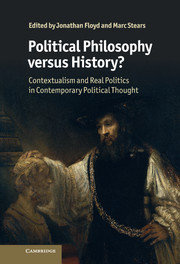 Political Philosophy versus History?
Political Philosophy versus History? Book contents
- Frontmatter
- Contents
- Note on the contributors
- Acknowledgements
- Introduction
- Part I The challenge of contextualism
- 1 Rescuing political theory from the tyranny of history
- 2 From historical contextualism, to mentalism, to behaviourism
- 3 Contingency and judgement in history of political philosophy: a phenomenological approach
- 4 Political philosophy and the dead hand of its history
- Part II The challenge of realism
- Index
- References
2 - From historical contextualism, to mentalism, to behaviourism
from Part I - The challenge of contextualism
Published online by Cambridge University Press: 05 June 2012
- Frontmatter
- Contents
- Note on the contributors
- Acknowledgements
- Introduction
- Part I The challenge of contextualism
- 1 Rescuing political theory from the tyranny of history
- 2 From historical contextualism, to mentalism, to behaviourism
- 3 Contingency and judgement in history of political philosophy: a phenomenological approach
- 4 Political philosophy and the dead hand of its history
- Part II The challenge of realism
- Index
- References
Summary
What is the significance of history for political philosophy? Or, what do political philosophers need to know of history, if they are to do their work as it ought to be done? Or, as a third formulation, what do we need to know of how societies have thought and lived in the past, in order to decide how they ought to be governed in the future? Whichever way one puts it, it is an unusually tricky question to answer, and not just because it admits of numerous plausible answers, most of which are perfectly compatible with at least one of the others, but also because it requires an unusual degree of clarity regarding the answer we give to a still further question, namely, what is political philosophy? What I should like to do here, therefore, is to begin by saying something about both what I take political philosophy to be and what I take political philosophers to do (and just why I treat these as two distinct questions will be clear from the answers I give to them). Following that, I shall then examine just one particularly plausible account of the significance of history for this subject – an account which I am going to call ‘historical contextualism’ – and then, following that, examine two alternative suggestions regarding just what we might learn when we consider not just the significance of history in general to political philosophy, but also the significance of ‘historical context’ in particular. My conclusion, ultimately, will be that whilst historical contextualism as a form of political philosophy fails to deliver the goods, adopting a historical perspective on the method our subject employs may well prove invaluable.
- Type
- Chapter
- Information
- Political Philosophy versus History?Contextualism and Real Politics in Contemporary Political Thought, pp. 38 - 64Publisher: Cambridge University PressPrint publication year: 2011
References
- 17
- Cited by


